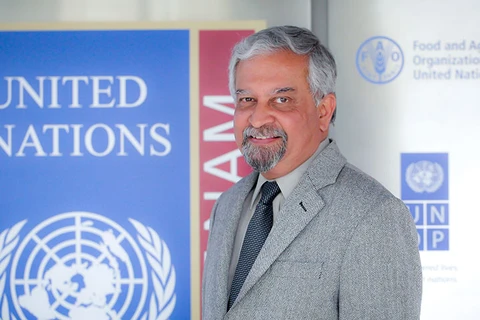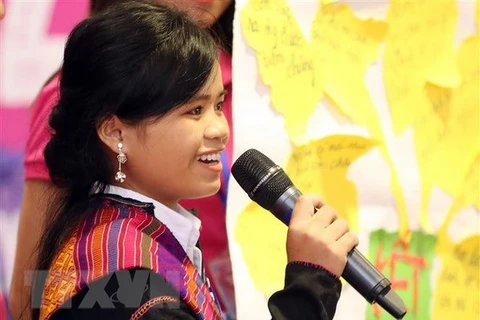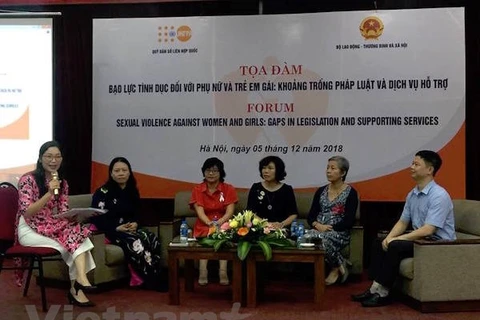 As part of the launching ceremony of the project ‘BRAVE – Because you are trusted’, a performance represents the pain victims of sexual assault suffer, especially when they told their stories to their family but were not trusted. (Photo: VNA)
As part of the launching ceremony of the project ‘BRAVE – Because you are trusted’, a performance represents the pain victims of sexual assault suffer, especially when they told their stories to their family but were not trusted. (Photo: VNA) Hanoi (VNS/VNA) - Victims of sexual abuse and other forms of gender-based violence not only suffer from physical and mental pain but also from the culture of victim blaming.
Nguyen Van Anh, Director of the Hanoi-based Centre for Studies and Applied Sciences in Gender, Family, Women and Adolescents (CSAGA), said that victim blaming and self-blame hurt victims of gender-based violence and victims of sexual assault in particular.
“Because of victim blaming culture, the victims did not dare to or could not reveal their stories,” she said.
Nguyen Thi Hieu, a researcher from Institute for Studies of Society, Economy and Environment (iSEE) said victim blaming is a phenomenon in which victims of crimes or tragedies are held accountable for what happened to them.
Blaming the victim is common in rape and sexual assault cases, where the victim of the crime is often accused of inviting the attack due to their clothing or behaviour.
Within victim blaming, women are told to change their actions to avoid being assaulted or raped, by dressing differently or avoiding certain situations.
Hieu said victim blaming could have originated from belief in a just world where people reap what they sow and get what they deserve and from sexism and defensive attribution hypothesis, where a person uses beliefs as a shield against the fear that one will be the victim or cause of a serious mishap.
Hieu added that in Vietnam, gender-based violence was a result of Confucianism, particularly sexism and the perceived value of women’s virginity before marriage.
Women who lost their virginity before marriage are often considered “dirty” and a source of shame for their family, leading to victims of sexual abuse and their family keeping quiet about the incident, she said.
Hieu and other researchers conducted a study collecting hundreds of stories about gender-based violence published on four major newspaper in Vietnam – Vnexpress.net, Tuoi tre (Youth), phunuonline.com.vn and Phap luat Thanh pho HCM ( HCM City Law) as well as thousands of confessions posted on Facebook page S.O.S – Share out Stories from 2016 and 2017.
The study found the way the stories were reported caused victim blaming. The reports tended to focus on the actions of female victims as causes for the violence. For example, if a wife has an affair, she has challenged her hot-tempered husband.
Suspects in sexual abuse cases were usually referred to in terms of their relation to the victim, instead of being referred to as a suspect in a crime.
Researchers said such word choice made the case become a “private family business”, tend to make victim responsible for what happened to them.
Few reports in the newspapers mentioned intervention by authorities, agencies or organizations that protect women.
Only cases with serious consequences were commented on by authorities, Hieu said.
A study by iSee also found most of victims want to speak out. The victims, especially those who suffered sexual assaults repeatedly, said they wanted help to end the situation or recover from the sexual assaults.
The victims suggested gender education for boys and girls should start early ab both school and in the home.
Parents and families should pay more attention to their children or tell them how to protect themselves.
Witnesses or confidants who are told about sexual assault should not ignore victims, they recommended.
Sponsored by the Australian government, three organisations – CARE International, iSEE and CSAGA, have held a ceremony to launch the project ‘BRAVE – Because you are trusted’ which focuses on addressing gender-based violence through changing the culture of victim blaming.
BRAVE stands for Building Responsibility and Accountability for Gender-based Violence Elimination.
The three-year project starting from May, 2018 aims to engage those who experienced gender-based violence, media and public in ending victim blaming.
The project is expected to educate those whom the victims share their stories with.
Instead of expecting victims to endure in silence, it is a call to action for policy makers and society to face up to how public attitudes and prejudices perpetuate violence, Acting Ambassador of Australia to Vietnam Justin Baguley said at the launching ceremony.
Moreover, instead of blaming victims, it is necessary for confidants to help them recover.
The project expects to reach more than 11 million people directly, benefit some two million indirectly, establish a network of victims and more importantly, help victims speak out against gender-based violence.
Baguley said BRAVE was the first project of its kind in Vietnam to challenge victim blaming and self-blame.
“It’s a new approach and it holds up a mirror to how the media portrays victims, distancing them from ourselves or somehow deserving of the aggression and harm. We know these tendencies exist in all societies and that they are damaging. They merely silence survivors and normalise gender-based violence,” he said.
Gender inequality underlined all violence against women and girls, he said, adding that women’s safety depended on work to displace the discrimination they face.-VNS/VNA
VNA























